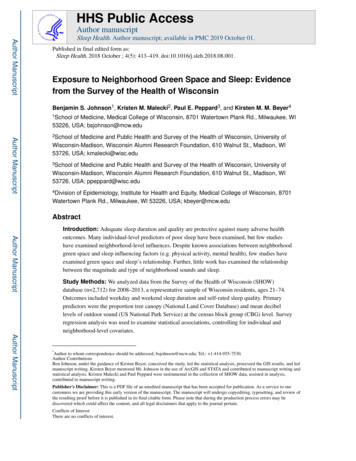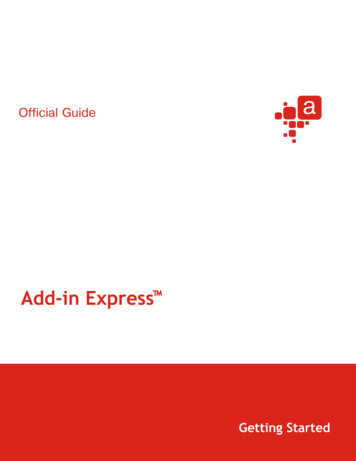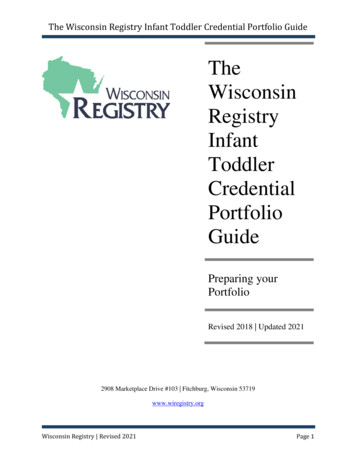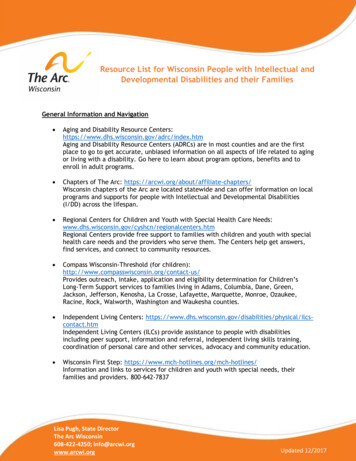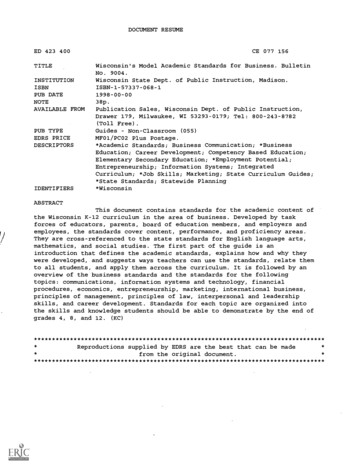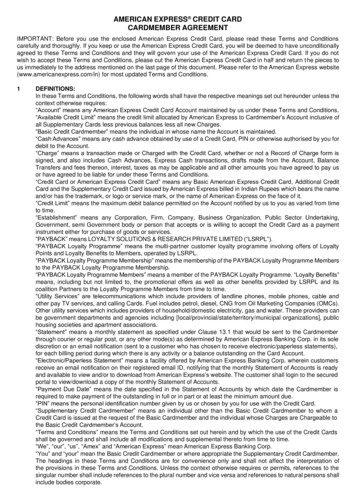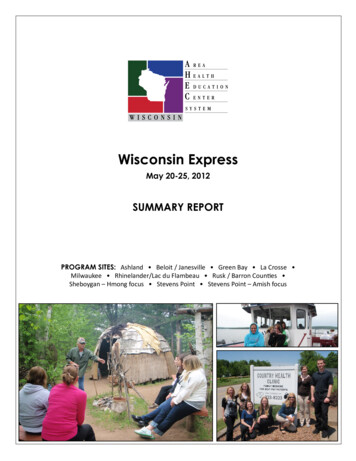
Transcription
Wisconsin ExpressMay 20-25, 2012SUMMARY REPORTPROGRAM SITES: Ashland Beloit / Janesville Green Bay La Crosse Milwaukee Rhinelander/Lac du Flambeau Rusk / Barron Counties Sheboygan – Hmong focus Stevens Point Stevens Point – Amish focus
OverviewWisconsin Express is a one-week cultural immersion experience designedto give health professions students the opportunity to study firsthandthe diverse local and regional healthcare resources and challenges in oneof Wisconsin’s urban or rural communities. The 2012 program offeredplacements at 10 sites with 75 students participating this year.SCHOOLS REPRESENTEDBY ParticipantsBellin College (3)Carroll University (1)Wisconsin AHEC covers most of the cost of student participation, including workshop fees; instructional materials; shared accommodations inhotel rooms, bed and breakfasts, or lodging maintained by a communityorganization; and transportation during the week. Participants paid a 100 program fee and the cost of some meals.Concordia University (13)STUDENT ParticipantsThe 75 students were selected from 141 applicants enrolled in a rangeof health professions programs across Wisconsin.Nicolet College (1)Pre- ‐Kinesiology(1)HealthCareAdministra on(1)HealthcareBusinessService(1)Marian University (2)MATC Madison (1)Northeast WisconsinTechnical College (3)University of Notre Dame (1)Neurobiology(1)UW-Green Bay (8)Therapeu cRecrea on(1)Sociology(2)UW-LaCrosse (9)Athle cTrainingandPre- ll University (1)UW-Madison (22)PublicHealth(1)UW-Milwaukee side (1)ExerciseAndSportsSciencePre- ‐Professional(2)UW-Rock County (1)Biochemistry(4)UW-Stevents Point (5)Wisconsin LutheranCollege adia onTherapy(1)PhysicalTherapy(1)Pre- ‐Occupa onalTherapy(3)CommunityHealthEduca on(4)SitesEach site group was multicultural and interprofessional in composition.Every AHEC region hosts at least one Wisconsin Express site. Ashland Beloit / Janesville Green BaySUPERIORAHECNorthwestAHECASHLANDRHINELANDER /LAC DU FLAMBEAURUSK / BARRON La CrosseNorthern HighlandAHEC Milwaukee Rhinelander /Lac du FlambeauMARINETTEAHECAHECWAUSAUNorthCentral AHECGREEN BAYSTEVENS POINT (2) Rusk / Barron Sheboygan –Hmong focusAHECLA CROSSEScenic RiversAHECAHECCASHTONSHEBOYGANAHEC Stevens Point Stevens Point –Amish focusMANITOWOCNortheastAHECMADISONBELOIT /JANESVILLESouth CentralAHECWisconsin Express SitesAHECAHECMILWAUKEEMILWAUKEEMilwaukee& SoutheastAHECAHEC Regional OfficesWisconsin Express 2012 Page 2Rhinelander site participantstalked with Marshfield Clinicstaff about local communityhealth programs.
Program ActivitiesOur intention is to acquaint students with a variety of regional healthcare issues and provide opportunities to interact with local practitionersand recipients of health care services.IMMERSION EXPERIENCESThe health care challenges and innovations within each site are unique,and student activities vary according to the character of the region.During summer 2012, highlights included: Beloit Police Department Drug and Gang Unit presentation Visit to Good Earth organic meat farm (affiliated with Amish co-ops) Meeting with a Mennonite physicianSheboygan site participantsmaking egg rolls by hand. Meeting with a doctor of Chinese medicine / acupuncture Tour of La Clinica, a multicultural muli-service free clinic in Wautoma Freedom House homeless shelter presentation; dinner with residents Bad River Indian Reservation clinic tour and Dancing 101 event Milwaukee Public Schools shadowing experience with a school nurse Tour of grocery store serving Hmong and Amish communities Domestic violence shelter tour and discussion at Bakakwsen i Shkwadem(“Door is Always Open” / Potowatomi Reservation)“I would say that this is anexperience you should not miss.I learned a lot about culturewithin our state. It also openedme up to a lot of experiencesthat I am now going to pursueon my own.”– La Crosse participant Disability awareness cook-out Tour of Amish school, homes, and shops; discuss Amish health care Participation in Salvation Army screening clinicReflectionAt the end of the week, students actively reflect on their experience injournal entries. Students write responses to these questions:1. What was your most significant or remarkable experience this week?2. How might your experiences this week affect your future practice asa health professional?Examples of their reflections are featured in this report (see sidebar).Stevens Point / Amish site participantsWisconsin Express 2012 Page 3“I enjoyed being able to relateto what was being discussed.Meaning, if you have not livedlike a person in poverty, youcan’t appreciate what is liketo be poor. The simulations allowed you to relate.”– Sheboygan participant“I learned that there are so manypeople that need our help inhealth care. We need to be moreunderstanding and open to thekind of heath care that theirculture might be accustomedto but we are not. I think thatI have a much more “judgefree” attitude when it comes tominorities and it will allow me toput any pre-judgment about apatient aside and treat them tothe best of my ability.”– Milwaukee participant
Site DescriptionsAshlandLori Cannon, RN8 student participantsThe Ashland site gives students the opportunity to see a wide variety ofrural health care settings, including women’s health, acute care, publichealth, tribal clinics, and others in the Chequamegon Bay region. Studentshear from a diverse group of practitioners who discuss the challenges andrewards of working in rural health in far northern Wisconsin, as well asculturally appropriate care for Anishinaabe (Ojibwe) populations. Studentslearn about the economics, history and unique nature of this area.Beloit / JanesvillEAngela Flickinger, MPH, RD, CPT4 student participantsThe Beloit/Janesville site offers students an opportunity to study and explorerural and urban issues related to health care and diversity in the region.Various organizations and health care disciplines offer students experiencesfocusing on the Hispanic, African American, uninsured/underinsured, homeless, and rural populations.ABOVE: Visit to farm project inRed Cliff (Ashland site)BELOW: Ashland site participantsenjoyed Chequamegon Bay.Green BayChris Vandenhouten, PhD, RN6 student participantsThe Green Bay site offers students an opportunity to explore the diversecultures in this area of the state, which include the Native American cultureof the Oneida Nation and the Hispanic communities. Students also get firsthand experience with uninsured, underinsured, and homeless populationsand spend time with health and social service providers.La CrossERobert A. Milisch, MEd, RRT6 student participantsThe La Crosse site gives students an overview of the background and healthcare needs of the Hmong and Amish populations in the area. Students meetwith a physician who treats Amish patients, an Amish apothecary and visitAmish homes and shops. Students learn about traditional rituals from aHmong shaman. Students participate in a community free clinic serving thosewith chronic illnesses who cannot afford traditional care. Students visit andparticipate in the activities of a homeless shelter.MilwaukeeSuzanne Letellier, MEd12 student participantsAt the Milwaukee site, students explore issues related to culture and healthcare access while interacting with a variety of health disciplines. Severalcommunity-based organizations host the team. Students interact with Milwaukee’s Hispanic, African American, and Hmong communities and thosewho are homeless or participating in AODA programs. Students also interactwith health professionals who work with underserved populations.Wisconsin Express 2012 Page 4“I recommend this experienceto anyone who is looking to apply. The things I learned in theprogram are something thatI had not experienced in myhealthcare schooling and theexposure helped me to learn somuch that I would not seek outto learn on my own.”– Stevens Pointsite participant“This is going to be one of thebest weeks of your life. Makesure to fully engage in theprogram.”– Beloit/Janesvillesite participant
Site Descriptions (continued)Rhinelander /Lac du FlambeauGail Nelson, MA8 student participantsThe Rhinelander/Lac du Flambeau site offers students opportunities toconsider health care issues facing rural and Native American communitiesin the Northern Highland region of Wisconsin. Students explore key healthconcerns such as chronic illness, obesity, substance abuse, and domestic/sexual violence Participants interact with professionals who experience thechallenge as well as the satisfaction of serving these populations.Rusk / barronJackie Pederson, RN, MS8 student participantsNEW for 2012! The Barron and Rusk County sites offer students an immersion opportunity to explore health care issues facing rural communities withan emphasis on the Somalian community. Students will visit free clinics,hospice programs, hospitals, long term care facilities, the domestic abuseshelter, public health, the Health Care Academy, the International HighSchool and others. In addition, program participants will have an opportunity to do a service project which will improve the medical supply needs ofthe county’s poor and underinsured.Sheboygan – Hmong focusJill Niemczyk, BS12 student participantsApproximately 6,000 Hmong live in Sheboygan. A health needs assessment(2000) documented serious problems in health care access and healthliteracy in this population. The Hmong Community Center has implementeda number of unique programs addressing these needs. Along with learningabout the programs, students enjoy a rich cultural experience gaining firsthand knowledge of Hmong history, culture and traditional health beliefs.Stevens PointJasia Steinmetz, PhD, RD5 student participantsThe Stevens Point site offers students a variety of experiences designed toillustrate the health care needs of low income, Hmong, Native American,and Hispanic residents of Stevens Point and surrounding rural communities.Students explore services that are available in Central Wisconsin includinga free health clinic serving low income, uninsured and migrant populations,and a shelter where students learn about aspects of shelter operation.Stevens Point – Amish focusKristen Lucas, MS6 student participantsThe Stevens Point–Amish site offers students opportunities to learn aboutAmish culture and rural health care practice. Central Wisconsin has asignificant Amish and Mennonite population in four counties. Students visitfamilies, businesses, public agencies, and health care providers in Amish/Mennonite communities to explore how respect for culture can interact withstate-of-the-art health care. They learn about the balance between cost ofmedical care and reduction of risk.Wisconsin Express 2012 Page 5“I understood that Milwaukeehas lots of culture, that manyindividuals experience homelessness, that there was drugand alcohol problems — butthis experience immersed meand really exposed me firsthand to the issues. WisconsinExpress definitely put theseissues right in front of me andgave me the opportunity tobetter understand them by talking with individuals and hearingfrom professionals that work inthe area.”– Milwaukee siteparticipant“I would encourage everyoneto apply to this program. It issuper fun and informational.The experience is a once in alifetime opportunity that willchange the way you look athealth care.”– Stevens Pointsite participant“Listening to people’s stories andhearing first hand how theywere living with the underprivileged situation that they werein. It changed my perception ofcertain groups of people whenan actual person was sittingthere interacting with me andallowing me into their livesrather than just hearing thestatistics. ”– Milwaukee siteparticipant“Wisconsin Express will openyour eyes to the beauty thatdiversity has to offer. It will makeyou more aware of health carecareer paths that you can take.It will make you more aware ofwho you are and the steps youhave to take to be the personyou want to be. ”– Rusk/Barron siteparticipant
Wisconsin Express is a Wisconsin AHEC program.About Wisconsin AHECJoin us next year!2013WISCONSINEXPRESSSun. May 19 – Fri. May 24Applications available onlinebeginning in December 2012:www.ahec.wisc.eduApplications due:Friday, February 15, 2013Early applications encouraged!For more information, contact:Keri Robbins, MS Ed.Wisconsin ExpressProgram Manager(608) 265-2442KROBBINS@WISC.EDUThe Wisconsin Area Health Education Center (AHEC) program is a healthprofessions education and outreach program supported by the State ofWisconsin, federal grants, the state’s health professions training programs,and local communities. It is part of a nationwide network of programs forimproving accessibility and quality of primary health care. The nationalprogram was designed to encourage universities and educators to lookbeyond their institutions to form partnerships that meet communityhealth needs, working toward the goal of decentralizing health professionstraining and linking communities with academic health centers inpartnerships to promote cooperative solutions to local health problems.The Wisconsin AHEC System consists of seven regional centers locatedin Manitowoc, Milwaukee, Madison, Cashton, Wausau, Superior, andMarinette. Each center operates under the direction of its own governingboard. A statewide program, located in the University of Wisconsin Schoolof Medicine and Public Health, administers state and federal contracts tothe centers and maintains several statewide programs. Representativesfrom the seven centers, health professions programs and communityat-large members all come together in a 22 member statewide board thatmeets quarterly to set overall program objectives and review progress.Wisconsin AHEC programs serve all the healthprofessions programs in the state. Over the last 20 years,project partnerships have included (in addition to the two medical schools)over 20 BSN nursing programs, eight advanced degree nursing programs,three physician assistant programs, three social work programs, the UWSchool of Pharmacy, the MPH programs, and a range of allied health andpreprofessional programs at the 13 UW System campuses, 21 privatecolleges, two tribal colleges and 13 UW System two-year campuses.Wisconsin AHEC Centers collaborate regionally with the Wisconsin TechnicalCollege System (16 colleges with 47 campuses and numerous outreachcenters) particularly the campuses offering associate degree nursingprograms and a variety of other health professions technical trainingprograms. Wisconsin AHEC has also worked with family practice residenciessponsored by the UW SMPH, Medical College of Wisconsin and La CrosseMayo programs, with a particular focus on the rural training track programs.Regional centers provide a range of programs and services in their regions.Program areas include the following: Enhancing the learning experience for all health professions studentsat community-based sites, with an emphasis on interdisciplinaryprograms, developing cultural effectiveness, and technology support; Supporting health careers recruitment program in underserved ruraland urban areas, to assist high school and college students from underrepresented populations prepare for entry into health professions schools; Supporting faculty mentors and preceptors at community-basedtraining sites with continuing education, technology support and otherservices to enhance the practice environment and maximize the abilityof health professionals in underserved communities to provide highquality health care; and Partnering with local organizations in a variety of outreach activities toimprove the health of the community.
nity to do a service project which will improve the medical supply needs of the county's poor and underinsured. SHEBOYGAN - HMONG fOcUS Jill Niemczyk, BS 12 student participants Approximately 6,000 Hmong live in Sheboygan. A health needs assessment (2000) documented serious problems in health care access and health literacy in this population.
